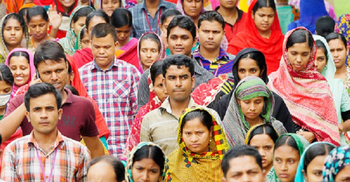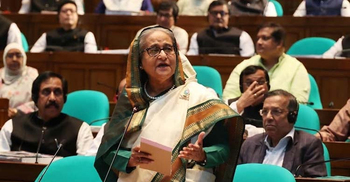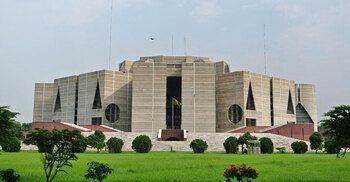Poverty rate comes down at 18.7% in Bangladesh

The poverty rate in the country came down at 18.7 percent at the national level, which is 20.5 percent in the rural areas and 14.7 percent in the urban areas, according to the key findings of the Household Income and Expenditure Survey 2022.
The survey findings also showed that the overall rate of extreme poverty in the country is 5.6 percent, which is 6.5 percent in the rural areas and 3.8 percent in the urban areas.
The poverty rate in the country in 2016 was 24.3 percent while the extreme poverty rate was 12.9 percent.
The findings of the latest HIES 2022, conducted during the period of January 1 to December 31 last year, was revealed at a function held at the auditorium of the Bangladesh Bureau of Statistics (BBS) at Agargaon in capital Dhaka on Wednesday.
Planning Minister MA Mannan spoke at the function as the chief guest while State Minister for Planning Dr Shamsul Alam, Statistics and Informatics Division Secretary Shahnaz Arefin, General Economics Division (GED) member of the Planning Commission Md Kawser Ahmed, World Bank representative Ximena V Del Carpio, Practice Manager, Poverty and Equity GP, World Bank spoke as special guests. Director General of the Bangladesh Bureau of Statistics (BBS) Md Matiar Rahman chaired the function while Director of the National Accounting Wing of BBS Ziauddin Ahmed gave the address of welcome.
Project Director of the HIES 2022 Mohiuddin Ahmed, made a power-point presentation on the key findings of the survey.
The survey findings showed that the daily intake of calories in the country increased over the years as it has reached 2393 kilocalorie in 2022 which was 2210.4 kilocalorie in 2016 while it was 2,318.3 kilocalorie in 2010.
It said the income Gini coefficient is 0.499 in 2022, compared to 0.482 in 2016 and 0.458 in 2010. On the other hand, the consumption Gini coefficient is 0.334 in 2022, 0.324 in 2016 and 0.321 in 2010. It shows that the concentration of income is slightly increasing.
Speaking on the occasion, Planning Minister MA Mannan said that Prime Minister Sheikh Hasina was very happy to know about the findings of the HIES-2022 as the poverty rate in the country has came down significantly despite the shocks of the COVID-19 pandemic and the Russia-Ukraine War.
He said that the government was able to attain such feat as the government did not go for complete lockdown, rather selected lockdown during the pandemic while the mills and factories were remained operational. Besides, he said that the government had announced stimulus packages for ensuring recovery from the pandemic which helped to maintain the growth momentum.
Mannan said had there been no such steps from the government, then the general point to point inflation could have gone to 13 percent now, but now it is below the double digit thanks to the different pragmatic steps.
He said that the internal force of the economy is very much intact while the 'one single golden step' is the power facility which is almost reaching to cent percent coverage.
Citing the survey findings, the Planning Minister said that inequality is still there and it is not acceptable. "We've to reduce it. There are some inequalities in culture, legal issues and access to various facilities......we'll have to address these,"
Referring to the lowering trend of poverty rate, he said, "We can eliminate poverty and we can do it. Our Prime Minister and we're very much committed to this end. We'll continue to work,"
Mannan also informed that the HIES would be held in every three years from now on with the own resources of the government.
Mentioning that the data of the BBS is very much reliable and the development partners even use its statistics, State Minister for Planning Dr Shamsul Alam said that the income inequality in the country over the last 14 years is almost stable.
Highlighting various socio-economic indicators where Bangladesh is still faring better compared to its neighboring countries, Dr Alam said that no other government except the Awami League government could deliver various services and facilities to the rural areas.
He said that Bangladesh is still performing better compared to India and Pakistan in terms of per capita income, debt to GDP ratio and child mortality rate.
Director General of the Bangladesh Institute of Development Studies (BIDS) Dr Binayek Sen said it was very nice to see that the rate of poverty including the extreme poverty is declining in the country.
He said that the poor section of people is now trying to become rich while the rural inequality has declined.
The HIES 2022 showed that the household's average monthly income has increased significantly as the household's average monthly income has increased in nominal terms to Taka 32,422 in 2022, from Taka 15,988 in 2016 and Taka 11,479 in 2010.
The recent data also showed that the household's monthly total expenditure has increased nominally to Taka 31,500 in 2022 from Taka 15,715 in 2016 and Taka 11,200 in 2010.
The HIES 2022 data illustrates that the share of food and non-food consumption expenditures in the household's has changed. Non-food expenditures are increasing gradually. The percentage of food consumption expenditure is 45.8 percent and non-food consumption expenditure is 54.2 percent in 2022, compared to 47.7 percent for food and 52.3 percent for non-food in 2016.
In 2022, approximately 14.1 percent of the household's had at least one member who opened a bank account during the last 12 months which doubles the rates in 2016 (7.5%) and 2010 (7.4%). This evolution presents a clear picture of the gradual improvement towards the financial inclusion of the household's.
Source: BSS







